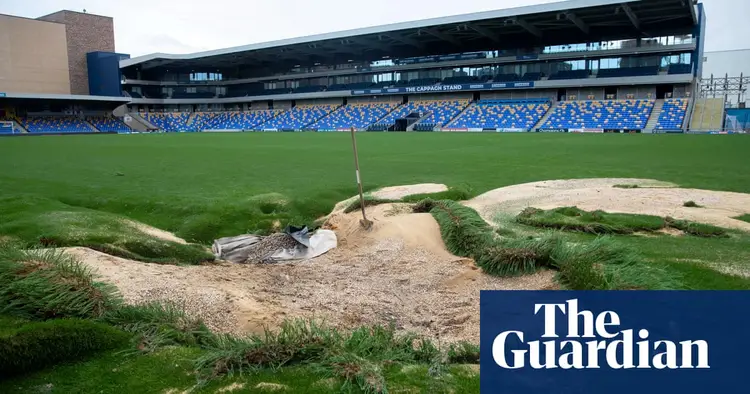AFC Wimbledon head to Newcastle in buoyant mood despite sinkhole saga

Recently, all the talk about AFC Wimbledon has revolved around issues off the field rather than the team’s performance. The team is dealing with a significant gap in one corner of the pitch caused by flooding. While crowdfunding initiatives that sought to support repairs managed to gather just over £120,000, these efforts were put on hold. Unfortunately, the timing of the match postponements couldn’t have been worse, especially after the team had a strong start to the season.
Wimbledon is currently in sixth place in League Two, even though they have played two fewer matches than the teams ahead of them due to the sinkhole issue at the Cherry Red Records Stadium. They've had a strong start to the season, winning four of their first six games, and they also managed to eliminate Premier League team Ipswich in the Carabao Cup, advancing to the third round. With this momentum, they feel confident heading into their rescheduled match against Newcastle on Tuesday.
Since its establishment in 2002, Wimbledon has operated under a model where fans have ownership, a rarity among clubs at a similar level. The team is well aware of the challenges that come with this, including the stress of securing the necessary funds to maintain and improve their fourth-tier status. Many people felt the strain as efforts intensified to help the club return to its traditional home at Plough Lane, which involved significant fundraising. Despite the difficulties faced, the hard work has paid off, even if the process has sometimes been frustrating.
This is just the latest challenge in a series of crises that have needed attention, and the team at Wimbledon has proven to be skilled at managing them. They have navigated everything from starting over from scratch to successfully raising £9.8 million in bonds from supporters, returning to their original home, and managing the difficulties brought on by the pandemic. Throughout these situations, they have demonstrated remarkable problem-solving skills for issues that might have seemed overwhelming to others. The funds raised in the past week, including £15,000 contributed by Newcastle, will help cover expenses. The club is still waiting for a complete assessment of the flood damage to determine its effects and whether repairs can be made quickly.
Wimbledon’s future is being steered in the right direction by Craig Cope, who heads football operations. Johnnie Jackson has been the manager for over two years, guiding the team to finish 21st and then 10th. While other clubs may not have shown such patience, Jackson has made consistent improvements given the right amount of time. The team’s recruitment and academy efforts are proving beneficial as they bring in revenue, with three players recently sold for over £1 million each. The most profitable transfer was Jack Rudoni, a product of the club’s academy, who was sold to Huddersfield for £1.75 million in 2022. This was made even more favorable by a 20% sell-on clause, which came into play when Rudoni was transferred to Coventry this summer for £5 million.
Below the main squad, the academy is generating a range of talented players. Goalkeeper Spike Brits was transferred to Manchester City, Leo Castledine went to Chelsea, and Justin Clarke joined Everton. Last season, the club made it to the fourth round of the FA Youth Cup, triumphing over Blackburn before narrowly losing 1-0 to Sheffield United. The academy is consistently producing talent that surpasses what many other League Two clubs are accomplishing.
Wimbledon also boasts a vibrant sense of community. They run two charitable organizations: the AFC Wimbledon Foundation, which focuses on football-related initiatives, and the Dons Local Action Group, which was established during the Covid pandemic to help provide meals for local residents. Have these charitable efforts and Wimbledon's history motivated fans to seek a brighter future for their own clubs? "Definitely," says Graham Stacey, who started the sinkhole fundraiser. "The support we've received has been incredibly inspiring, with messages pouring in from teams and fans from all over the country. About 120 other clubs and their supporters have contributed."
"I've been truly touched by the encouragement and kind messages I've received. Reading them brings me just as much joy as seeing the donations roll in. It's been amazing and uplifting."
Since Plough Lane couldn't accommodate Newcastle last week, Wimbledon is now set to make the trip to St James’ Park. It’s a mixed bag of emotions for them, as they would have liked to host Eddie Howe’s well-funded team in south-west London. However, they’ll have the opportunity to play at one of the most iconic stadiums in the country, in front of a crowd of 52,000 fans. Wimbledon boasts the sixth-highest average attendance in the fourth tier, with almost 8,000 supporters showing up to watch them claim victory against their fierce rivals, MK Dons, two weeks ago.
These numbers contribute to the club's sustainability, established by a dedicated group of supporters who were determined to keep football alive in Wimbledon. Conversations are taking place regarding the possibility of bringing in outside investment, but this could complicate the ownership structure. This is just one of the many difficult choices that need to be addressed at Wimbledon.
"It’s a remarkable accomplishment, but sometimes we overlook the fact that our club is still quite new in the grand timeline of football history,” Stacey, a former member of the Dons Trust board, explains about the fan-ownership system. “There’s much more ahead for us. In just 20 years, we began from scratch, made our way back into the Football League in nine years, moved up to League One, and constructed a £32 million stadium in Wimbledon. We're proving that great things are possible."
Don’t stress over a small dip in the field. As Stacey puts it: “We’re Wimbledon, and we tackle these challenges head-on.”









































